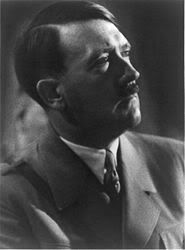 Each of us, myself included, is guilty of being egocentric about the time they live. Hence, the current spat between Senators Obama and Clinton as they vie for their party’s nomination, the ongoing saga of Attorney General Alberto Gonzales as the Bush Administration implodes, global warming and the Iraq War seems apocryphal.
Each of us, myself included, is guilty of being egocentric about the time they live. Hence, the current spat between Senators Obama and Clinton as they vie for their party’s nomination, the ongoing saga of Attorney General Alberto Gonzales as the Bush Administration implodes, global warming and the Iraq War seems apocryphal.Well, for a little perspective consider this: eighty-six years ago today Adolph Hitler was introduced as the Fuhrer of Germany’s National Socialist German Workers Party known as the Nazis.
Here is the back-story of this seminal moment in history. Munich was a stronghold for the Nazi Party and a bastion of ultra right-wing German nationalists. Following World War One a cabal of disenchanted anti-Semites and anti-communists were looking for a home. Unlike today’s neocons, these zealots were not chicken hawks. Most were embittered veterans of World War One and included Army officers determined to destroy Marxism and replace the Weimar Republic centered in Berlin.
Adolph Hitler, a corporal in World War One was seen more as a front man for the party founded by Anton Drexler in 1919. He had the charisma the rest of the party hoped to exploit and let carry them to power. An executive committee governed the party and the original members considered Hitler overbearing and too dictatorial. Curiously, that’s what many of the original Bolsheviks thought of Stalin after Lenin made him General Secretary of the Communist Party in Soviet Russia.
Although many regarded Hitler and his party as a joke, he burned with homicidal ambition and hoped to promote the Nazi cause beyond Munich. In the summer of 1921, Hitler visited nationalist groups in Berlin. During his absence from Munich, the leadership of the Nazi Party revolted. To weaken Hitler's position, they formed an alliance with a group of socialists from Augsburg.
Hitler rushed back to Munich and countered them by announcing his resignation from the Party on July 11, 1921. Without Hitler the Nazi Party was finished and even his rebellious comrades knew it. Sensing an opportunity, Hitler went for the jugular and declared he would only return if he was made chairman and given dictatorial powers.
Members of the executive committee, led by Anton Drexler, initially resisted Hitler's power grab. An anonymous pamphlet appeared entitled: "Adolf Hitler: Is he a traitor?" Hitler's lust for power as well as the violent entourage that surrounded him was severely criticized. Hitler responded to the publication in a Munich newspaper by suing for libel and later won a small settlement. I suppose Hitler’s opponents could have have benefited from tort reform. Had the suit not taken place all of history might be different.
Instead, the executive committee of the Nazi Party backed down and Hitler's demands were put to a vote of the party members. He received 543 votes for, and only one against. At the next party gathering, July 29, 1921, Adolf Hitler was introduced as Führer of the Nazi Party, the first time he was addressed in that manner.
Twelve years later, with Hitler at the helm, the Nazi Party was able to exploit the rules of parliamentary democracy and take over the country. And we all know what happened next.
If you’re interested in reading about Hitler’s early years I highly recommend Charles Bracelen Flood’s classic, Hitler: The Path To Power.
No comments:
Post a Comment